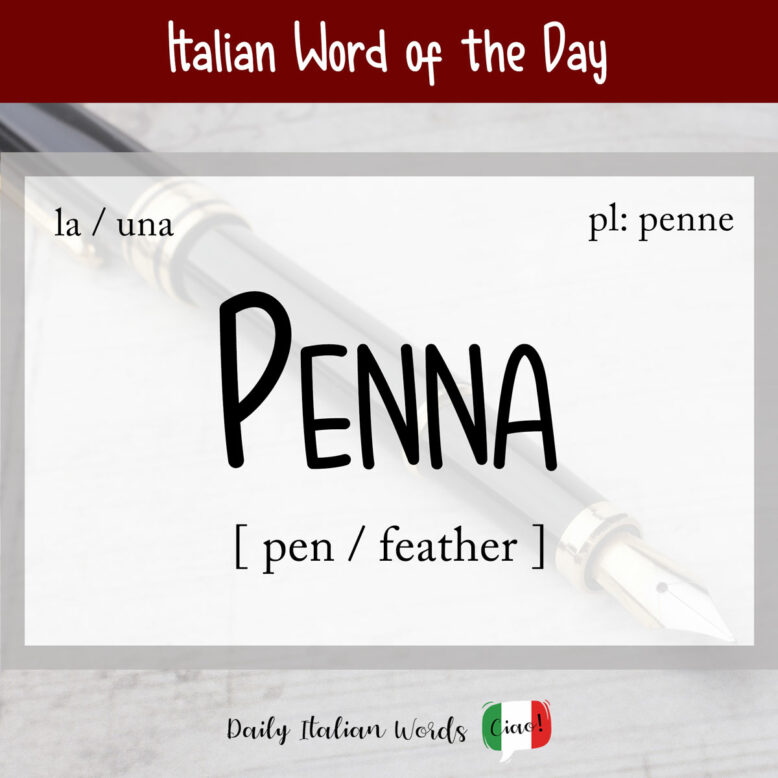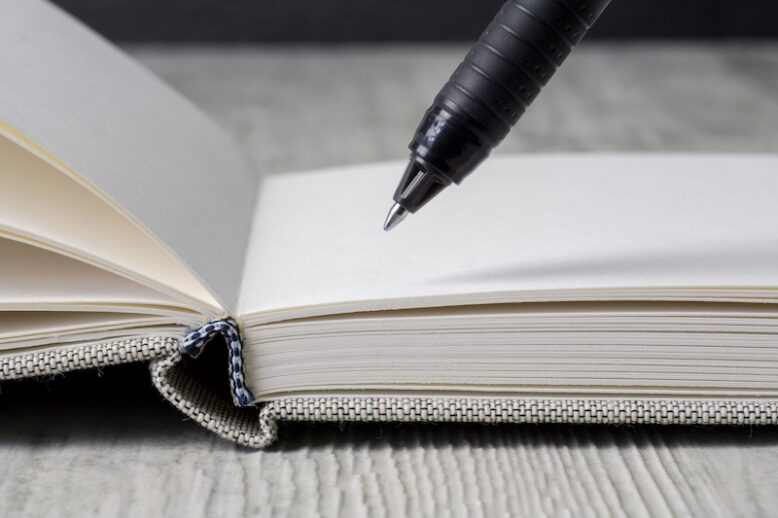Before the arrival of electronic devices with a keypad or keyboard, it would have been difficult to imagine life without the humble pen. For centuries, it served as an essential tool for recording our thoughts, telling stories, and documenting important events.

Pen in Italian translates as penna, a term derived from the Latin pinna meaning “feather of a bird”. It is a feminine noun that takes the following definite and indefinite articles:
- la penna = the pen
- le penne = the pens
- una penna = a pen
- delle penne = (some) pens
Penna also happens to one of two words for feather, the other being piuma. The relationship between pens and feathers becomes evident when considering the historical context: prior to the invention of steel nibs and subsequently the fountain pen, people relied on quills (also known as penne). These quills were writing implements crafted from the main wing or tail feathers of large birds. To write, individuals dipped the quills into inkwells or ink bottles, enabling them to transcribe their thoughts and gather information.
A couple of common pens with which you should be familiar are the ballpoint pen, known as a penna a sfera or more informally biro in Italian, and the aforementioned fountain pen, known as a penna stilografica.
Non sono più capace di scrivere bene con la penna. Ormai sono troppo abituato alla tastiera!
I’m no longer able to write well with a pen. I’m too used to the keyboard!
Here are a few other useful terms containing the word penna:
- amico di penna = penpal
- penna / pennetta USB = flash drive (pennetta is a diminutive of penna)
- pennino = nib (pennino is another diminutive for penna)
- penna a feltro = felt-tipped pen

Due to the fact that authors historically used pens to write down their thoughts and stories, the word penna also came to be associated with the term for an author, writer and even penmanship. For example:
- essere un uomo di penna (literally “to be a man of pen”) = to be a writer/scholar
- avere una penna tagliente (literally “to have a cutting pen”) = to write scathing things
- essere una buona penna (literally “to be a good pen”) = to be a good writer
Penso che sia una delle migliori penne del giornalismo italiano.
I think he’s one of the best writers in Italian journalism.
Important: Penna should not be confused with the similar sounding pena, which can be translated as any one of the following: pain, suffering, penalty or sentence. Compare the pronunciation below:
Penna vs Pena
Penna, usually seen in its plural form penne, is also the name given to a popular cylinder-shaped type of pasta. They were designed to resemble the steel nib of fountain and dip pens, and can either be smooth (lisce) or furrowed (rigate).

To conclude this article, let’s take a look at a couple of common idiomatic expressions containing the word penna:
Occhio alla penna!
Literal meaning: Eye on the head (of the sail)!
English translation: Watch out!
This is a nautical expression that entered the common language, and is used as a general invitation to be careful.
Lasciarci / rimetterci le penne
Literal meaning: To leave / lose one’s feathers
English translation: To die / suffer a serious injury
Heather Broster is a graduate with honours in linguistics from the University of Western Ontario. She is an aspiring polyglot, proficient in English and Italian, as well as Japanese, Welsh, and French to varying degrees of fluency. Originally from Toronto, Heather has resided in various countries, notably Italy for a period of six years. Her primary focus lies in the fields of language acquisition, education, and bilingual instruction.


